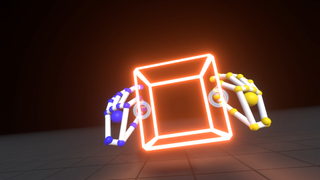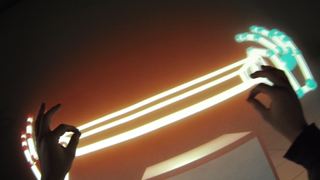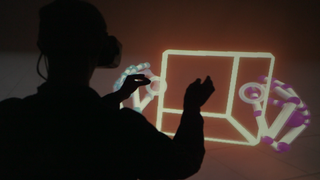Leap Motion Announces Orion Hand Tracking For VR And AR

Leap Motion revealed Orion, the company’s next generation hand-tracking product. Leap Motion said Orion has been designed to be used specifically for VR and AR and “makes it possible for VR developers and headset makers to tap into the full power of natural hand and finger input.”
“Orion software represents a paradigm shift in how we do hand tracking. It’s built from the ground up specifically for VR. It’s radically smoother, faster, more reliable, and far more capable than even the best of what’s existed before,” said David Holz, Leap Motion Co-founder and CTO.
We had the chance to speak with Michael Buckwald, Leap Motion Co-Founder and CEO, about the launch of Orion, and he seemed genuinely excited about the release. Buckwald told us that, to him, Orion “lives up to the original vision for Leap Motion.” He said it provides a “massive increase in capability and performance” and is “able to track hands and fingers extremely fast.”

“The holy grail of virtual reality is a sense of total presence and immersion. With Orion, we’re enabling developers and OEMs to create that type of experience. People can use their own hands and fingers to interact with digital content in VR with the same ease and nuance they use in the real world,” said Buckwald.
Leap Motion considers Orion an entirely new product, separate from the original Leap Motion device. The company is releasing a beta version of the Orion software that will work with existing Leap Motion trackers, but Buckwald said that Orion requires a combination of hardware and software to work properly. The software is being released now so that developers can get an early start on creating applications for the platform.
Added Buckwald, "Because this shift is so stark, we’re making Orion software available on our peripheral starting today so developers can begin exploring a totally new generation of experiences in virtual reality."
The main benefit of Orion over the previous Leap Motion product, beyond being designed specifically for VR and AR, is higher precision tracking. The company said that Orion tracks faster, maintains tracking in high occlusion scenarios and, most notably, it's purportedly better at distinguishing your hand from "cluttered" backgrounds, "allowing you to bring your hand close to or even in contact with other surfaces."
Stay on the Cutting Edge
Join the experts who read Tom's Hardware for the inside track on enthusiast PC tech news — and have for over 25 years. We'll send breaking news and in-depth reviews of CPUs, GPUs, AI, maker hardware and more straight to your inbox.
If you recall, we had significant trouble with this exact scenario while testing the Leap Motion last year, and we suspected a hardware upgrade would be necessary to correct it.

Buckwald told us that the hardware will come later this year, but unlike the original Leap Motion developer kit, it won’t be released as a standalone device. Orion hardware will be embedded in VR and AR HMDs. Buckwald was unwilling to divulge further details, or name any partners working with Orion hardware, but he said Leap Motion is working with multiple OEMs to bring hardware to market.
The Orion software development kit is available today from Leap Motion’s developer site. Buckwald told us that Leap Motion’s Blocks demo is also available if you want to experience the improvement that the software has with existing hardware. He noted that you will need a head mount or HMD mount for your Leap Motion hardware in order to use or develop for Orion.
Follow Kevin Carbotte @pumcypuhoy. Follow us on Facebook, Google+, RSS, Twitter and YouTube
Kevin Carbotte is a contributing writer for Tom's Hardware who primarily covers VR and AR hardware. He has been writing for us for more than four years.
-
eldragon0 Reply17523267 said:There's hope for Oculus yet.
This has nothing to do with Oculus.
Intuition would insinuate that Joe feels the Rift is going to fail with the current controllers, and that it will need something like this to succeed.
As much as I am excited for the Rift and will be getting one, I'm not a fan of the controllers they have, It's like they want you to believe that your hand really doing something, but they know it's just pretend. If something like this was incorporated and successful it would be a massive step in the right direction.
Most Popular


